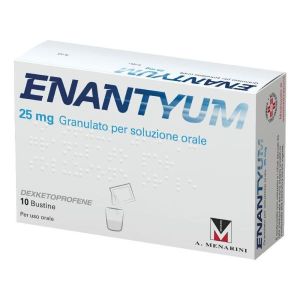Ship in Europe, Find out rates!
Enantyum 10 Sachets Oral Granules 25 Mg

- box Delivery in Italy in 24/48 and free returns
- star3.000+ positive reviews
- dropboxOver 60,000 products in the catalog
Dexketoprofen based tablets.
Therapeutic indications
Enantyum Tablets is used in the symptomatic treatment of painful conditions of mild to moderate intensity, such as musculoskeletal pain, dysmenorrhea, dental pain.
Dosage and Posology
Depending on the nature and intensity of the pain, the recommended dose is 12.5 mg every 4-6 hours or 25 mg every 8 hours. The total daily dose should not exceed 75 mg. Undesirable effects can be minimized by using the lowest effective dose for the time strictly necessary to eliminate symptoms (see section 4.4). Enantyum is indicated only for short-term treatments and administration should be limited to the symptomatic period only.
In elderly patients it is recommended to start therapy with the lowest therapeutic dose (50 mg total daily dose). The dosage can be increased to that recommended for adults only after good tolerability has been ascertained. Due to the risk profile (see section 4.4), the elderly should be monitored with particular care.
Patients with mild to moderate hepatic dysfunction should initiate therapy at reduced doses (50 mg total daily dose) under close medical supervision. Enantyum must not be used in patients with severe hepatic dysfunction.
In patients with mild renal impairment (creatinine clearance 60 - 89 ml / min) the initial dosage should be reduced to 50 mg total daily dose. Enantyum should not be used in patients with moderate to severe renal impairment (creatinine clearance <59 ml / min).
Enantyum granules for oral solution has not been studied in children and adolescents. Therefore, as safety and efficacy data are not available, the product should not be used in children and adolescents.
Dissolve the entire contents of each sachet in a glass of water: mix well to dissolve completely. The solution thus obtained must be swallowed immediately after reconstitution. Concomitant administration of food delays the rate of drug absorption (see “Pharmacokinetic properties”), therefore, in case of acute pain, it is recommended to administer the drug at least 15 minutes before meals.
Overdose
The symptoms following overdose are unknown. Similar drugs have produced gastrointestinal (vomiting, anorexia, abdominal pain) and neurological (drowsiness, dizziness, disorientation, headache) disturbances. In case of accidental or excessive intake, immediately adopt an adequate symptomatic therapy based on the clinical condition of the patient. Activated charcoal should be given within one hour if more than 5 mg / kg have been ingested by an adult or child. Dexketoprofen trometamol can be eliminated by dialysis.
Contraindications
- Patients with hypersensitivity to the active substance, or to other NSAIDs, or to any of the excipients
- Patients in whom active ingredients with similar action (eg acetylsalicylic acid, or other NSAIDs) trigger asthma attacks, bronchospasm, acute rhinitis, or are the cause of nasal polyps, urticaria or angioneurotic edema;
- Known photoallergic or phototoxic reactions during treatment with ketoprofen or fibrates
- Patients with a history of gastrointestinal bleeding or perforation related to previous NSAID therapy
- Patients with active peptic ulcer / gastrointestinal haemorrhage or a history of gastrointestinal bleeding, ulceration or perforation
- Patients with chronic dyspepsia
- Patients who have other active bleeding or bleeding disorders
- Patients with Crohn's disease or ulcerative colitis
- Patients with severe heart failure
- Patients with moderate to severe renal dysfunction (creatinine clearance ≤ 59 ml / min);
- Patients with severe hepatic impairment (Child-Pugh score 10 –15);
- Patients with bleeding diathesis and other coagulation disorders
- Patients with severe dehydration (caused by vomiting, diarrhea or insufficient fluid intake)
- During the third trimester of pregnancy and breastfeeding.
Side effects
The table below, grouped by device and listed in order of frequency, lists the adverse events, probably related to dexketoprofen trometamol, which occurred during the course of clinical studies and after the product was marketed:
- Disorders of the blood and lymphatic system
- Very rare: thrombocytopenia neutropenia
- Disorders of the immune system
- Rare: edema of the larynx
- Rare Moloto: Anaphylactic reactions, including anaphylactic shock
- Metabolism and nutrition disorders
- Rare: anorexia
- Psychiatric disorders
- Uncommon: insomnia; anxiety
- Nervous system disorders
- Uncommon: headache, dizziness, somnolence
- Rare: paraesthesia, syncope
- Eye disorders
Very rare: blurred vision
- Ear and labyrinth disorders
- Uncommon: dizziness
- Very rare: tinnitus
- Cardiac pathologies
- Uncommon: palpitations
- Very rare: tachycardia
- Vascular pathologies
- Uncommon: hot flashes
- Rare: hypertension
- Very rare: hypotension
- Respiratory, thoracic and mediastinal disorders
- Rare: bradypnea
- Very rare: bronchospasm, dyspnoea
- Gastrointestinal disorders:
- Common: nausea and / or vomiting, abdominal pain, diarrhea, dyspepsia.
- Uncommon: gastritis, constipation, dry mouth, flatulence
- Rare: peptic ulcer, peptic ulcer haemorrhage or peptic ulcer perforation
- Very rare: pancreatitis
- Hepatobiliary disorders
- Rare: hepatitis
- Very rare: hepatocellular injury
- Skin and subcutaneous tissue disorders
- Uncommon: rash
- Rare: hives, acne, increased sweating
- Very rare: Stevens Johnson syndrome, toxic epidermal necrolysis (Lyell's syndrome), angioedema, face edema, photosensitivity reaction, pruritus
- Musculoskeletal and connective tissue disorders
- Rare: back pain
- Renal and urinary disorders
- Rare: acute renal failure, polyuria
- Very rare: nephritis or nephrotic syndrome
- Reproductive system and breast disorders
- Rare: menstrual disturbances; prostatic disorders
- General disorders and administration site conditions
- Uncommon: fatigue, pain, asthenia, chills, malaise
- Rare: peripheral edema
- Diagnostic tests
- Rare: liver function test abnormalities
The most common side effects are gastrointestinal in nature. Peptic ulcers, gastrointestinal perforation or bleeding, sometimes fatal, may occur, especially in the elderly. Nausea, vomiting, diarrhea, flatulence, constipation, dyspepsia, abdominal pain, melaena, haematemesis, ulcerative stomatitis, exacerbation of colitis and Crohn's disease have been reported following administration.
Gastritis was observed less frequently. Edema, hypertension and heart failure have been reported in association with NSAID therapy. As with other NSAIDs, the following side effects may occur: aseptic meningitis, which may occur predominantly in patients with systemic lupus erythematosus or connective tissue disorders; haematological reactions (purpura, aplastic and haemolytic anemia, and rarely agranulocytosis and bone marrow hypoplasia). Bullous reactions, including Stevens Johnson syndrome and toxic epidermal necrolysis (very rare). Clinical studies and epidemiological data suggest that the use of some NSAIDs (especially at high doses and for long-term treatments) may be associated with a modest increased risk of arterial thrombotic events (e.g. myocardial infarction or stroke).
Pregnancy and breastfeeding
Enantyum tablets are contraindicated during the third trimester of pregnancy and during breastfeeding.
Inhibition of prostaglandin synthesis can adversely affect pregnancy and / or embryo / fetal development. Results of epidemiological studies suggest an increased risk of miscarriage and cardiac malformation and gastroschisis after use of a prostaglandin synthesis inhibitor in early pregnancy. The absolute risk of cardiac malformations is increased from less than 1% to approximately 1.5%. The risk has been considered to increase with dose and duration of therapy. In animals, administration of prostaglandin synthesis inhibitors has been shown to cause increased pre- and post-implantation loss and embryo-fetal mortality. Furthermore, an increased incidence of various malformations, including cardiovascular, has been reported in animals given prostaglandin synthesis inhibitors during the organogenetic period. However, animal studies with dexketoprofen trometamol did not indicate reproductive toxicity. During the first and second trimester of pregnancy, dexketoprofen trometamol should not be administered except in strictly necessary cases. If dexketoprofen trometamol is used by a woman attempting to conceive, or during the first and second trimester of pregnancy, the dose and duration of treatment should be kept as low as possible. During the third trimester of pregnancy, all prostaglandin synthesis inhibitors can exhibit:
- the fetus to:
- cardiopulmonary toxicity (with premature closure of the arterial duct and pulmonary hypertension)
- renal dysfunction, which can progress to renal failure with oligo-hydroamnios;
- the mother and the newborn, at the end of pregnancy, to:
- possible prolongation of bleeding time, an anti-aggregating effect that can occur even at very low doses;
- inhibition of uterine contractions resulting in delayed or prolonged labor.
It has not been established whether dexketoprofen is secreted in human milk.
Special warnings
Use with caution in patients with a history of allergic conditions. The concomitant use of Enantyum and other NSAIDs, including selective cyclooxygenase 2 inhibitors should be avoided. Undesirable effects can be minimized by using the lowest effective dose for the shortest possible duration of treatment needed to control symptoms.
Expiry and retention
Check the expiration date indicated on the package. The expiry date indicated on the package refers to the product in intact packaging, correctly stored. This medicinal product does not require any special storage conditions.
Warning : do not use the medicine after the expiry date indicated on the package.
Composition
One tablet of Enantyum contains:
Active principle
25 mg as dexketoprofen trometamol
Excipients
Ammonium glycyrrhizinate, Neoesperidina-dihydrocalcone, Quinoline yellow (E104), Lemon flavor, Sucrose, Hydrated colloidal silica
| Destination | Cost | Detail |
|---|---|---|
| Italy | €5,90* | 24/72H |
| Austria, France, Germany, Slovenia | € 13* | 3 days |
| Belgium, Luxembourg, Portugal, Netherlands, Spain | € 14* | 4 days |
| Bulgary, Cechia, Hungary, Poland, Romania, Slovakia | € 19* | 5 days |
| Denmark, Estonia, Finland, Ireland, Lithuania, Latvia ,Sweden | € 22* | 5 days |
| United Kingdom, Switzerland, Greece, Malta/td> | € 30* | 7 days |
| Canada | € 40 | 7 Days |
European shipments with express courier: FedEx, MBE, DHL
*For the shipment outside band B ther's an extra cost of 22€ *For the shipment outside band C ther's an extra cost of 30€ Delivery Times exclude Saturday and Holidays
For Islands and Areas of difficult Accessibility the shipments are made in 72 hours and the cost will be increased by 15€


